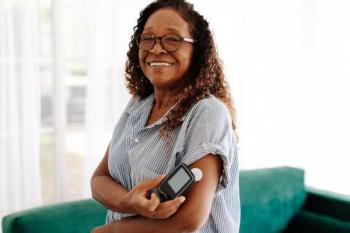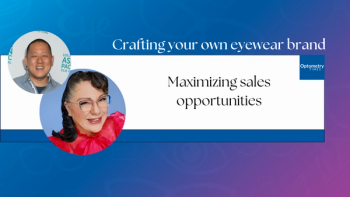
AOA 2024: The Black EyeCare Perspective on allyship in eye care
Jacobi Cleaver, OD, FAAO, gives an overview of a panel on allyship given by Black Eyecare Perspective at their event hosted at AOA 2024.
Jacobi Cleaver, OD, FAAO, discusses a Black EyeCare Perspective event on allyship in optometry, featuring lectures and a panel discussion with key figures, coinciding with Juneteenth. He highlights the profession's response to recent racial tensions and the growth of the Black EyeCare Perspective (BEP) Pre-Optometry Club from five members to over 225. Cleaver emphasizes the importance of mentorship and networking for students and allies alike; together, we can grow and improve the optometric industry.
Video transcript
Editor's note: This transcript has been lightly edited for clarity.
Jacobi Cleaver, OD, FAAO:
My name is Dr. Jacobi Cleaver. The event is twofold: It's going to be, we're going to start off with a lecture regarding allyship presented by Dr. [Essence] Johnson and Dr. [Janette] Pepper. And then afterwards we are going to go into a panel, which will feature myself, an incoming student, Lydia Holland, who will be a first coming optometry student at UMSL [University of Missouri St. Louis], and she also serves as the president of our pre-optometry club. So this is a real special moment. And Dr. Johnson will also be on the panel as well, and Dr. Glover will give a call-to-action type speech towards the end. So what better day to do it and on actual Juneteenth? Right.
So in partnering with Johnson & Johnson and AOA, we're able to make this come, you know, come from just an idea on a piece of paper and then bring it to fruition.
If I had to rewind and we go back to about 4 years ago, the when, you know, the racial tension and the George Floyd and, and all those things were happening—and the pandemic—at the same time, and optometry was extremely monumental in responding to those events. So with that being said, optometry came in, they really listened to our concerns, or not just my concerns, but how can we make the profession more diverse, more accepting, and how can we support the students that's coming in? And that's just pretty much been the gist of it since then. And you know, if you would ask me four years ago, if I will be standing here giving this interview with you guys, or how much a BEP [Black EyeCare Perspective] has changed, or the Black EyeCare Perspective Pre-Optometry Club has grown, then, you know, I wouldn't have believed it. But we're here now; we have over 225 students. Like I said, we started 4 years ago, and actually our first year cohort will be graduating next year. So we're looking forward to that [and] hopefully, we can plan out a big event to celebrate that.
But I would like to see mentorship start at the pre-optometry level, continue through the student level, and continue as the students matriculate into actual optometrists and become colleagues and stuff. Because you know, you don't know what you don't know. And there's a wealth of information out there. And by the time they finish school, they will be excellent optometrists, every single one of them, but we need to make sure that they're supported, they get the tidbits and the advice that they need to be successful not only in practicing, but outside of that, and in their communities and everything else. So that's allyship to me, in a nutshell.
We want a full circle moment; we want to embrace everyone who comes in, and keep them there. That way, they're welcome, and they're not only satisfied with their career choice, because we want to grow optometry, you know, we can say this and that about minority, we need more minority representation, [and] that's true. But we also need more optometrist period. You know, and if we, you know, we back into what there's 330 million people in the US, and depending on who you quote, there's between 40 and 60,000 optometrists, right? So there's gonna be a shortfall somewhere. So we need more optometrists. Representation does help, though, as well.
I would say start at the conferences. I didn't take the conferences as seriously as I could have as a student, right? But at that time, you're just being a student trying to put out as many fires as you can, and you want to just kind of be in the event. Now, the advice I would give to students is go to the classes, network, go to all the alumni association dinners, or whatever else and network with people because you never know what you have in common with whom until you have a conversation.
In partnership with Johnson & Johnson, this is actually our second time doing it. Last December, we were able to gather 15 or so pre-optometry students, took a trip down to Jacksonville, Florida, to the Johnson & Johnson Vision Institute, they did a factory tour with just a full day program. If there was one thing that was so instrumental in changing, it was that. The students, you know, of course, they hadn't experienced anything like that before. This was the first time almost being—I don't want to say being courted or spoiled, but that's exactly what it was, right? And they really enjoyed it, and they still talk about the experience. So this year, we changed things up a little bit. And we'll be going back to Jacksonville in about a month or so [with] 14 pre-optometry students, but the only difference is that these students have already been accepted into schools. So they'll do this and then matriculate into their program. So it's going to be another special event. Of course, any mobile clinic events that we can take part of, visiting as many campuses as we can, HBCU [Historically Black colleges and universities] campuses. And we just want to kind of keep the momentum going. This position requires you to be flexible. So, you know, whenever there is an opportunity, we want to be sure that we're not stretching ourselves too thin, so we can provide the best experience possible.
Like I said, we started with 5 members, and Dr. Johnson and myself are the co-founders of that club. And so we started with 5 members, and it was all Zoom and everything. And then we got off of the Zoom call, and immediately after that, we had a phone call and we were just so stoked about it because they showed up, right? You just never know. You just never know. She was a little bit more optimistic than I was; not that I was negative about it, but you just never know. Like at the time 4 years ago, there was a lot going on, but we have 5 people show up, and to grow to over 225 members is pretty impressive. We have a president, vice president, and a secretary, so now we I can kind of take the flower on the wall approach now and kind of let them run things. And it's really cool to watch them develop and grow. Like I said, we have our first cohort graduating next year, and I almost can't even believe it. But it's it's been such a fun experience just hanging out with them, you know, taking in their worldview of things. And then, when they ask for advice, I can offer it. Then they actually listen, right? So it's a really cool feeling, really cool feeling.
Newsletter
Want more insights like this? Subscribe to Optometry Times and get clinical pearls and practice tips delivered straight to your inbox.













































